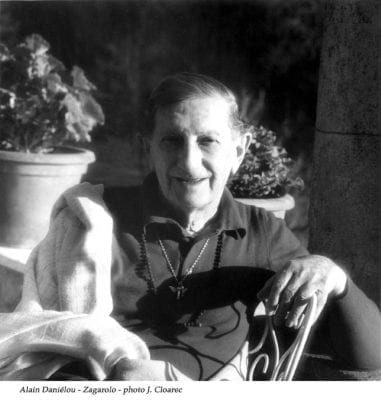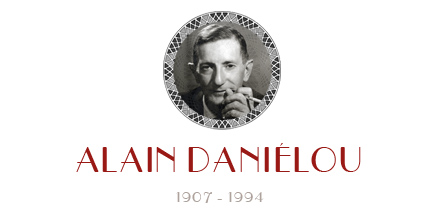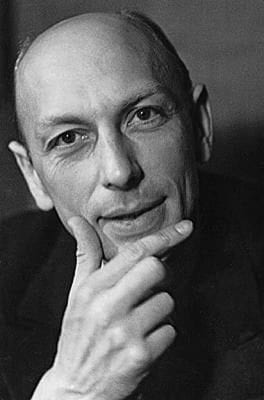Eros Counterpointed : Henri Michaux’s vision of cosmic voluptuousness and Alain Daniélou’s divinization of eroticism
 Adrián Navigante
Adrián NaviganteAlain Daniélou Foundation Research and Intellectual Dialogue
Michaux’s vision of voluptuousness in his writings about his mescaline experience presents various features pointing to a cosmic dimension of Eros. This vision is not only the result of a subjective experience of altered states of consciousness, but also an open door to consider the possibility of an immediate access to a trans-personal élan vital with manifold articulations. Adrián Navigante relates part of the background and the content of Michaux’s experience to Alain Daniélou’s conception of divinized eroticism, exposing transversal similarities and reflecting on some dichotomic aspects.
The Belgian poet Henri Michaux (1899-1984) is known mostly for his ‘psychedelic experience’ covering the period between 1954 and 1966. Many readers erroneously connect his experimentation with mescaline and other psychotropic substances with the kind of crazy and uncontrolled drug adventure typical of the American Beat Generation (Jack Kerouac, William Burroughs and Allen Ginsberg), but only a few delved into the nuanced depth of the poetical elaboration related to that experience.
In the twelve years of coping with the relationship between drugs and madness, Michaux kept a thorough record of his sessions, painted his visions and elaborated poetry and prose with an eye to shedding light on the never-fully-understood realm of mental activity. His work is a very interesting observation and first-hand experience of what in Patañjali’s Yogasūtra appears as citta-vṛtti, that is, “fluctuations of the mind” or “turmoil of consciousness”. Whereas in the classical philosophy of yoga the word vṛtti has a negative connotation – since it is related to a state of whirl, hence confusion and fragmentation, and needs ‘suppression’ [nirodaḥ] –, Michaux thinks, on the contrary, that the acceleration of the mind produced by mescaline necessarily leads to an instance of emptiness, since the flow of consciousness, when rightly stimulated and exacerbated, dissolves all forms.
Emptiness in the works of Michaux has an ambivalent character, since it can either stimulate spiritual progression or alienate the mind in a turmoil of dissolved forms. But the key references in his experience – especially those depicting a sort of transit from the experience of the individual to a transpersonal domain – do not necessarily revolve around the semantic field of ‘emptiness’. Michaux speaks of ‘plenitude’, ‘intensity’, ‘ecstasy’ and even ‘voluptuousness’, he resorts to Hindu deities and puts an end even to the literary game of continuity in order to embrace the indisputable truth of direct (mystical) experience when it comes to describing his most impressive vision: that of an unending diversity of gods, in his fifth experience of L’infini turbulent.
The scope of Michaux’s experience is very broad and does not follow the reductive line of classical yoga. It is true that there is a spiritual experience related to the ‘doors of perception’, cast wide open through mescaline consumption (he had access to visions the character of which goes far beyond any perceptive or cognitive insight), but within the context of his ‘psychedelic sessions’, his spirituality takes the form of an amplification rather than a reduction or a restriction regarding normal worldly parameters. Within the framework of Hindu spirituality, this poet would be very close to the Tantric experience he himself quotes towards the end of his account, that of the Kulārṇavatantra: “he [the Tantric vir]takes pleasure in all instances of delight, but no evil can besmirch him”1.
Michaux’s vision of an unending plurality and diversity of the divine described in the fifth experience of L’infini turbulent is necessarily related to eroticism. He speaks of an “erotic trance” and “non-human delectation”2. The immediate external context of those experiences is related to Hindu religious poetry and erotic sculpture3. It is for this reason that, even if his spiritual quest may be different from that of Alain Daniélou (we shall see why in due course), the conception of eroticism stemming from the latter may be useful the better to understand the scope of the poet’s experience, his limitations and ambiguities – mostly due to his modern Western and Christian education. Alain Daniélou’s conception of eroticism shows us the difference between the scope of Michaux’s poetry (whose source is always trans-personal) and the limits of the poet himself. Precisely in the non-identity of ‘poetry’ and ‘poet’ (that is, the tension between expansion of scope and fixation of limits) lies the value of a form that touches infinity and does not claim any right to it, letting the magic of the cosmos flow in the stroke of a pen.
Alain Daniélou’s ‘divinized eroticism’:
Hindu poetry of life beyond moral prescriptions
Alain Daniélou’s lesson in eroticism is an affirmation of Life beyond the narrow scope of ego-centred experience. Cosmologically viewed, eroticism begins when the tension that resulted in the creation of the universe polarises itself and seeks to restore the union that existed prior to creation. Eros presupposes a dually configured substratum of manifestation working on the very texture of phenomenal diversity. Resorting to classical Hindu texts like Chāndogya and Bṛhadāraṇyaka Upaniṣad4, Daniélou shows us that polarisation is the first tendency leading to the manifested world, crystallizing first as orientation (space) and movement (time), afterwards as directed movement introducing the dimension of duration and contributing to the reciprocal complex of matter and sensation, which illustrates the living inter-dependency of subject and object5. Daniélou calls this cosmo-logic of creation “the divine”, and adds that it is manifested “in every pro-creation, in every creation, in every voluptuousness”6.
The implications of the former sentence are manifold. In the first place, pro-creation (something that for many people represents the body as opposed to the soul) also belongs to the divine order of things, both because it is the manifestation of a power that goes beyond the will and the desire of individuals, and because every pro-creation takes place within specific rhythmic patterns and cycles. Secondly, creation (and here we should think of artistic works) reproduces on the level of human experience what is radically external to the boundaries of everyday consciousness – but it does not alter the logic of cosmic patterns. Thirdly, voluptuousness appears as the immediate manifestation of divine power in the field of human experience and is therefore not at all foredoomed to the egotistic frustrations and destructive excesses that many spiritual trends ceaselessly affirm. If “the union of sexes is the expression of the nature of being”7, there is something mysterious, magical and incomprehensible in the very erotic act, something that has nothing to do with possessiveness, debauchery and perdition, but rather with an experienced wisdom related to cosmic patterns.
 Alain Daniélou – Zagarolo
Alain Daniélou – Zagarolophoto: jacques cloarec
According to Daniélou, living Nature [prakṛti, mahāśakti, natura naturans et naturata] reproduces the rhythm of being, and eroticism can be the human mirror of that rhythm if human consciousness expands itself beyond its ego-centred limits. If the cosmogonic act is related to the desire of breaking the primordial unity8, the erotic act implies the reverse process, through which the elements of the cosmic Being are re-united in the most sublime sacrificial act. In the accomplishment of that act (traditionally framed in a ritual), the forces of creation are experienced both in an act of introspection and by means of devotional participation in the mystery of reciprocation. From this perspective, voluptuousness has little to do with the type of sexual excesses usually related to human destructiveness9. It is, on the contrary, an active participation in the mystery and beauty of a dynamic trans-personal pattern that is the source of every manifestation of life.
With his Tantric creativity and his unprejudiced knowledge of Hindu tradition, Alain Daniélou challenges the pitfalls of a culture based on manifold strategies of suppression regarding the power of eros: condemnation of the body, denigration of matter, separation of force from every material aspect and amalgamation of form with pure spirit. These are features that distinguish Western mainstream culture (dominated by a special type of repressive morality) from other religious and cultural conceptions – including subversive currents in the Christian tradition attempting a sacred restitution of matter (and therefore sensuality as divine power).
To what extend does Henri Michaux share Daniélou’s expanded vision of eroticism and what consequences does he draw from immediate contact with the abyssal roots of those forces?
Michaux’s erotic vision of the Infinite
Throughout the whole of his mescaline experience, Michaux insists on the poet’s on-going struggle with the drug in order to access another type and another dimension of knowledge. After the fashion of Alain Daniélou, Michaux does not want to change but rather to understand reality, both in its external and in internal forms. These two poles come closer when human consciousness is ‘altered’ – that is, expanded and straightened – by psychotropic substances, producing a fantastic reciprocation of “visions and fluidity”10 as if a coalescence of subject and object were possible. Why should the form of this experience be a ‘struggle’? To reach a vision of coherent totality, a beatific insight into the dynamics of the divine or even a moment of delight [jouissance] challenging human finitude, the poet must go through the most violent fragmentation, atomization and dissolution of consciousness, a true descensus ad inferos, an initiation into the realm of turbulent infinity. For Michaux, this is always an ambivalent experience, in which revelations flow through the gaps of one’s own being and shake the very structure of the mind that we associate with ‘sanity’; an experience in which the realm of the finite, usually seen as a prison by spiritual seekers, suddenly appears as a desirable oasis, preventing the atrocities of a “the Great Whirl [le Grand Tourbillon]”11.
In following the whole of Michaux’s psychedelic phase, that is, seven years of experience from 1954 to 1962 and twelve years of literary elaboration from 1954 to 1966, we notice a progression in his relationship with mescaline. In his first book, Misérable Miracle (1956), Michaux is overwhelmed, the madness induced is too strong and the artificial nature of the paradise is a feature of an infernal reversal that sometimes dominates the scene of experimentation altogether. From L’infini turbulent (1957) to Paix dans les brisements (1959) and Connaissance par les gouffres (1961), there is a clear progression: the experience becomes less dramatic (though not less strong), and there are semantic signs of an adaptation of the experimental subject to the effects of the substance (already in the titles of the works: “peace” and “knowledge”, even fragmentary and somehow threatened, replace the ambivalent opposition “misery-miracle” and the references to an almost unbearable “turbulence” of being). Balance is gained through confidence and familiarity12.
Already in his second book of the mescaline period, L’infini turbulent, the reader encounters a sort of beatific vision that needs to be recalled before dealing with the experience of cosmic eroticism, not only because it is a clear sign of the special place that Indian religion and culture have in the author’s literary production, but mainly because the erotic vision could be seen as a complement and expansion to the first vision of the divine. Michaux’s account of this irruption of the divine into the world of human existence has no parallel in the whole of his production, and it is so unflinchingly affirmed that it generated negative responses on the part of literary critics like Maurice Blanchot, who was disappointed to see the open-endedness of literary production totally frustrated by an article of faith. Michaux writes: “the incredible, what I had yearned for since my childhood, what I had utterly excluded as impossible to experience, the unheard-of, the inaccessible, the excessively beautiful, the sublime always forbidden for me, finally took place. I saw millions of gods”13. Of course, for Michaux this is no declaration of faith, but rather an immediate, concrete and experiential fact, as he explicitly avows: “But somebody could object the following: after all, didn’t you just believe what you saw? To which I would say: why would I just believe? They were just there”14. The problem appears when the reader is supposed to follow him: either one must have gone through that experience or just take it for a metaphysical nec plus ultra15. Does everything come to a standstill with this account? We shouldn’t think so. Michaux experiences the infinite in the modality of multiplicity: millions of gods. His account tells us something about his fascination with Hindu Polytheism with its endless perspectives reproducing themselves endlessly and taking divine form every instant. It seems that for Michaux the one and the many go hand-in-hand with each other when the many appear transfigured and the one is not fixed in a homogeneous feature of transcendence. For Michaux one and many are closely and essentially connected; the problem is duality: mind and matter, soul and body, good and evil and other drastic divisions. This is the product of a delimitation exercised by a limited state of consciousness. What happens when the mind goes beyond those limitations?
In the first part of L’infini turbulent, Michaux distinguishes three modes of the infinite: pure, demonic or diabolical, and insane. In his mescaline period, he became acquainted with all three of them. Michaux’s vision of millions of gods corresponds to the first mode of the infinite. In his first book on mescaline, Misérable Miracle, he retells an overdose experience, a fit of induced insanity from which he returns quite traumatised16. The reader has to wait for the erotic vision in order to be introduced to the demonic infinite. Demonic or diabolical? That is the key question. Michaux is always very precise with the terms he uses, but in this case there is a semantic oscillation, as if he could not decide whether there is a difference or not. The difference between ‘demonic’ and ‘satanic’ was very well explained by Paul Tillich in his essay Das Dämonische (1926), in which he states that demonic power is creative and produces form17, whereas satanic or diabolical power destroys every form and frustrates every attempt to create form18. From this perspective, Michaux’s erotic vision should be classed as ‘demonic’, in the first place because it is all about something ‘visible’, something that reveals itself to the experimenting subject: “I haven’t yet been able to understand, what? The fact that is it not the vision that counts, but the trance that betrays, arouses me and grows, grows, grows and pushes me and precipitates me into utter enjoyment”19. This revelation (which has a form corresponding to Michaux’s vision) does not entail features of any other normal ‘look’, but is rather internal, a vision ‘from within’ [sub specie interioritatis]that nevertheless implies an absence of clear boundaries between inner and outer realms: “The whole world seems to experience an extraordinary pleasure […]The earth and the waters and the mounts, also the trees offer an extravagant outlay in the torsions of lasciviousness”20. If Georges Bataille affirmed that eroticism is a distinctively human phenomenon (as opposed to procreation)21, Michaux’s vision de-centred the human aspect and expands eroticism to natural phenomena and even artificial objects. In fact, artefacts were Michaux’s neutral refuge when he was overwhelmed by the illumination of mescaline, but the erotic revelation does not leave anything out. He cannot trust the neutrality of anything in the universe, because all forms are animated by the power of an unleashed eros that resembles an infinite dislocation and an earthquake22. After all, eroticism is not just part of the Infinite caught by the poetic and psychedelic vision; it is simply the other name of the infinite.
Negative and positive aspects of Eros
If we consider Michaux’s experience of cosmic eros in his mescaline experience, one of the most conspicuous aspects is its ambivalent character. He speaks, for example, of a “descent into the delights of indecency”, a “huge exhibition of defilement”, “an impure or antipure absolute” and “grotesque rhythms […]engaged […]in sexophobia” 23. The defiling aspect is associated with profanity, which seems to be the opposite of Daniélou’s sacralisation of eroticism. Daniélou emphasizes the cohesive and unifying power of kāma as well as its liberating intensity, whereas Michaux points to the aspect of dissolution contained in the very effect of erotic power on the level of the individual: “an impossible rhythm […]. Dissolution! Dissolution! That is where I find myself within this trance, and it is impossible to escape: exultation through general derangement”24. Daniélou, on the contrary, takes a broader point of view: “Erotic realisation is an unavoidable need of human balance […]. Human beings have to fulfil their desires, and only after can they free themselves from everything they desire, love, accomplish, in order to attain the real freedom of non-action, and afterwards of non-being”25. This point of view regards not only the cosmic roots of desire but also the social function of its fulfilment and the framework in which that is possible. But Michaux’s point of view is not just that of an individual overwhelmed by an incontrollable cosmic force. It is also an experiential ascertainment of a force that is impossible to explain and very difficult to control when experienced in its fullness. If an individual is saturated by that force, he enters an “infernal sphere”26, but there is no sadism or cruelty there. Michaux makes it clear that what characterizes that experience is “a general, universal impurity, exclusively sensual […], sensuality without mixture and universally overflowing”27.
There seems to be two reasons for Michaux’s ambivalent description of the cosmic eros. The first one is the inevitable reaction of the individual experiencing it first-hand, which is the case of his erotic vision: he is overwhelmed, and there is not only fascination with that but also fear and even a sense of awe. The second is the effect of the erotic power: it dissolves in order to unite, it reduces solid matter to ashes and burns the distinctive traits of a person. Behind this point of view it is clear that although India was important for Michaux, the spiritual model he used for his poetry has Christian roots and therefore rejects the symmetrical association of the erotic with the divine28. His quotation of Kulārṇavatantra toward the end of L’infini turbulent shows where his limitations as poet (and therefore as a human being) lie. The “satanic trial” of his erotic vision did not permit him to say the same words as the Tantric adept of that text: “He indulges in all instances of delight, but he is not besmirched by evil”29. This means that Michaux was fully affected by the experience, hence he could not assume the perspective of a detached observer – this would imply a dose of asceticism or indifference toward the erotic that he was not prepared to assume. The fundamental question is whether the problem lies in the opposition ‘ascetic-erotic’. In L’érotisme divinise, Alain Dánielou traces a continuity between the erotic and the ascetic: since asceticism is a negation of life, one should embrace it after ruling out all other paths of mundane and/or spiritual self-realization – even the identification with the gods, because the Indian gods also belong to the sphere of kāma. Behind Michaux’s visionary attempt, there is a man who wanted to come closer to a type of spiritual model based on the opposition between right and wrong, good and evil, pure and impure, etc. Daniélou’s search for an erotic cosmology implies, on the contrary, a return to old pre-Christian values and modes of existence that, in his view, are a potential solution to many problems of Western civilization today. It suffices to mention some features of Shaivism that Daniélou himself emphasized: respect of all forms of life in nature, de-construction of the place of human beings in the cosmos, acceptance of natural patterns and cycles with an eye to learning one’s own position within that field, and a will to learn and share (as opposed to power and greed). This philosophy can be seen as a complement to Michaux’s intuitions, on condition that the visionary poet elaborates on his hermeneutical tools and assumptions in order to counter-balance the dark aspects of immediate saturation in cosmic eroticism through the light shed by Daniélou on the same subject.
- Apud Henri Michaux, L’infini turbulent, in: Œuvres Complètes II, p. 877.
- Henri Michaux, Ibidem, pp. 866-867,
- He explicitly mentions a reading of “Hindu religious poems” together with “Buddha’s life”. Shortly after that he refers to “the images of the Hindu pantheon”, both male and female (cf. Michaux, Ibidem., p. 864).
- Cf. his Upaniṣadic quotations in: Alain Daniélou, L’érotisme divinisé, pp. 51-53.
- Cf. Alain Daniélou, L’érotisme divinisé, p. 19.
- Alain Daniélou, Ibidem., p. 52.
- Alain Daniélou, Ibidem.
- Cf. Taittirīyabrāhmaṇa, 3.11.8.4: prajāpatir akāmayata prajā sṛjeyeti sa tapo ’tapyata [Prajāpati desired: may I become many].
- When sexuality is denounced as destructive, a specific (and isolated) aspect is emphasized, which points in the opposite direction, as the integrative effect of forces that Daniélou describes with the help of Hindu mythology and cosmology. Destructiveness implies lack of proportion and lack of rhythmical patterns, hence an utter isolation of human desire from the rest of the cosmic tissue of forces, or perhaps more precisely a betrayal of one’s own place in the cosmos. As opposed to this view, Daniélou always emphasizes the aspect of restitution, the perception of wholeness and the expansive element of eroticism due to its immediate connection with divine (expansive and integrative) and not purely human (restrictive and possessive) patterns.
- Henri Michaux, Ibidem., p. 808.
- Henri Michaux, Ibidem., p. 813.
- In L’infini turbulent, Michaux speaks of the Buddhist dispositions of Bardo Tödol (The Tibetan Book of the Dead) as strategies to appease the mescaline effects and “make an ally out of the agitator”. He also prescribes “confidence in approaching the Infinite” (Henri Michaux, Ibidem., p. 814).
- Henri Michaux, Ibidem., p. 852.
- Henri Michaux, Ibidem., p. 853.
- The gods are an ultimate point of transfiguration, without which the subject experiences a permanent acceleration through which time becomes devoid of all spatialization and every objective content. As he himself writes: “Lack of gods: proliferation and time” (Henri Michaux, Misérable miracle, in: OC II, p. 678).
- Cf. Henri Michaux, Misérable miracle, V: l’expérience de la folie, in: OC II, pp. 723-758.
- Cf. Paul Tillich, Das Dämonische, in: Der Widerstreit von Raum und Zeit, Gesammelte Werke VI, Stuttgart 1963, p. 43.
- This is the reason why Tillich states that the satanic has no existence in itself, since everything that exists must be able to reach a form (cf. Paul Tillich, Ibidem., p. 45).
- Henri Michaux, L’infini turbulent, OC II, p. 866.
- Henri Michaux, Ibidem., p. 867.
- Georges Bataille, L’érotisme, in : Œuvres complètes X, Paris 1987, p. 17.
- Henri Michaux, L’infini turbulent, OC II., and also p. 869.
- Henri Michaux, Ibidem., p. 869.
- Henri Michaux, Ibidem., p. 871.v
- Alain Daniélou, L’érotisme divinisé, p. 166. But even from the perspective of individual erotic experience, Daniélou is very close to a harmonious plenitude, as one can see in his rather mystical account of his first sexual encounter: “Donald was a baseball player, a twenty-year colossus two metres high. One evening, he came into my room and took me in his arms without asking me for permission. All of a sudden, everything was filled with light, an incredible voluptuousness invaded my whole body. I muttered to myself: ‘there must be a God, otherwise this bliss would not be possible’” (Alain Daniélou, Le Chemin du Labyrinthe, Paris 1981, p. 73).
- Henri Michaux, L’infini turbulent, OC II, p. 873.
- Henri Michaux, Ibidem., p. 869.
- To account for it, it suffices to read Michaux’s statement that in eroticism “the diabolic operation exists” (Henri Michaux, Ibidem., p. 871), which does not prevent him from saying “I am not any longer embarrassed, nor do I feel ashamed” (Henry Michaux, Ibidem., p. 870).
- Apud Henri Michaux, Ibidem., p. 877.

 Henri Michaux
Henri Michaux